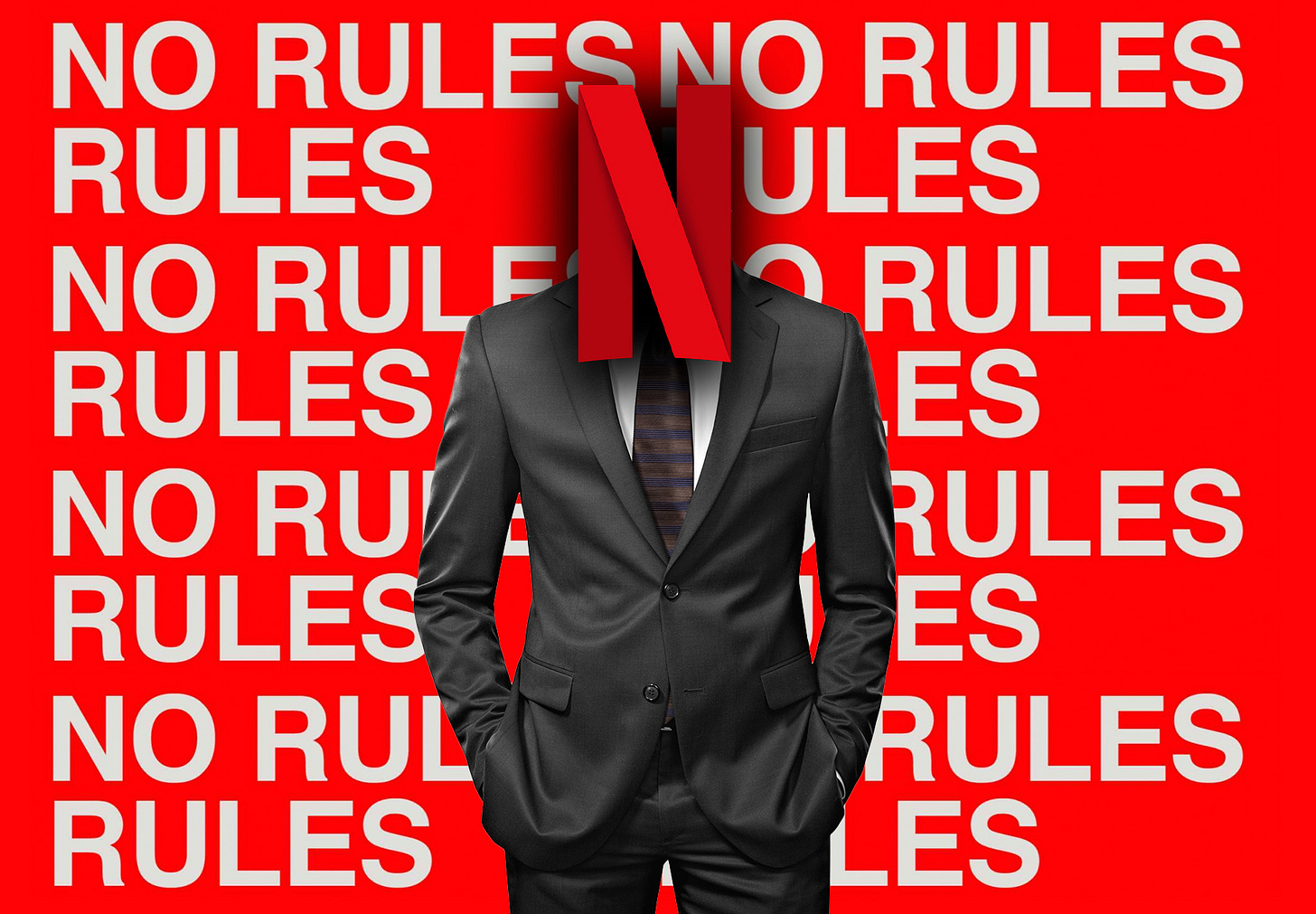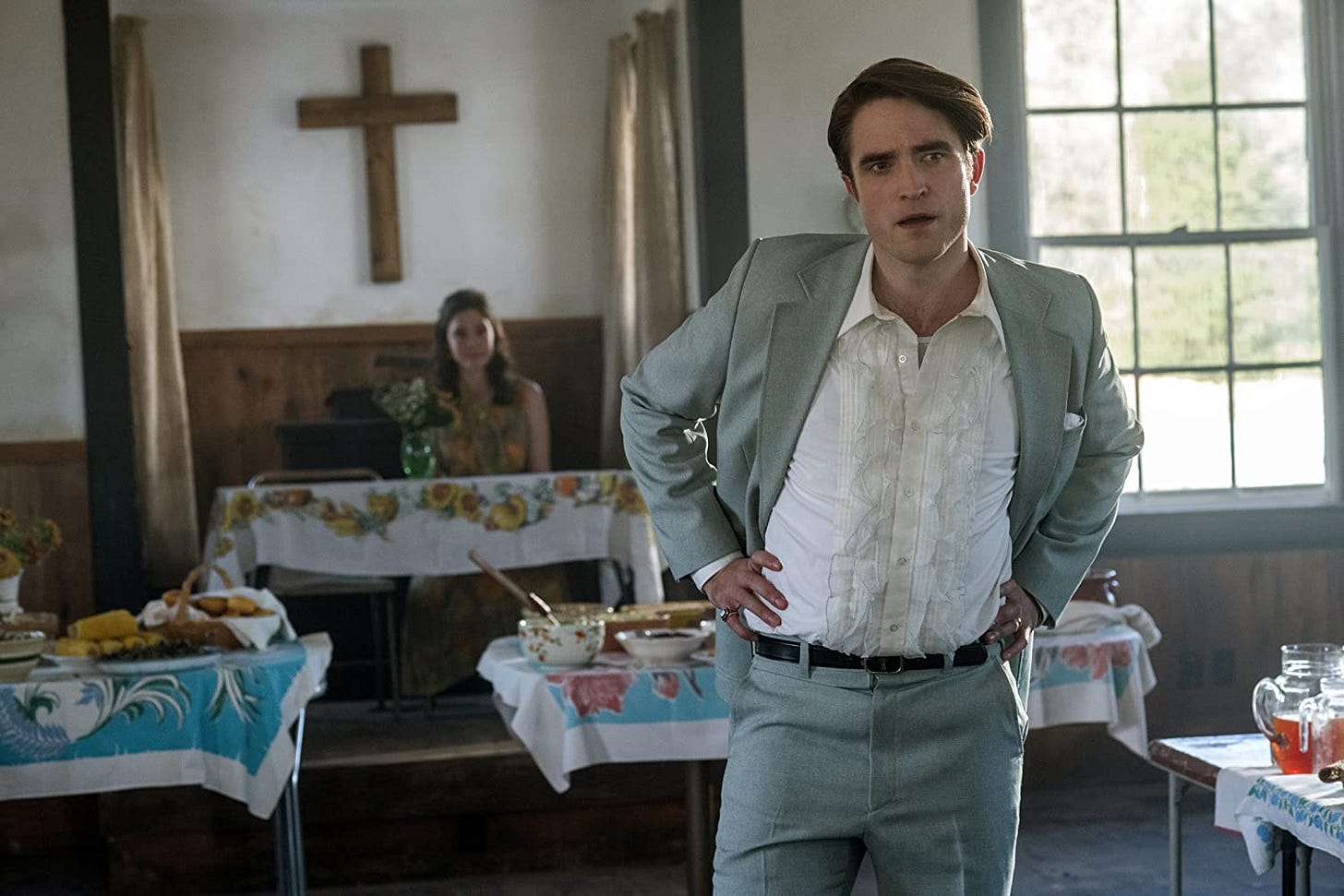What Is Netflix, Exactly?
How a new book on Netflix corporate culture can—and can't—help us understand the streamer. Plus: 'The Devil All the Time' reviewed!
Before we get started today: Join Bulwark+! Screen Time remains free for now, but I can’t promise it shall always stay that way. If you like this newsletter and enjoy my podcast, keep it sustainable and ad-free by signing up for Bulwark+. It is a very affordable $10 per month or an even-more-affordable $100 per year. And if you have any questions, about this or anything else, you can always drop me a line directly: bunch@thebulwark.com.
And now: On to the show. . .
No Rules, Just Get It Right (Or Spectacularly Wrong)

What is Netflix?
I mean, we all know what Netflix is: the world’s most popular streaming service, bringing a combination of licensed and original content into 193 million or so homes around the world. We know what it does: it delivers entertainment straight to your TV via the Internet (and, for two million or so of the disc-committed, via USPS). We know that it is spending billions on producing TV shows and movies, and we know that it is competing for Emmys and Oscars.
But while reading No Rules Rules: Netflix and the Culture of Reinvention by Netflix CEO Reed Hastings and The Culture Map author Erin Meyer, I was struck by how little of that goes into making the company successful, at least from the CEO’s point of view. Yes, this is an advice book aimed at making your business more efficient; no, it is not an Easy Riders, Raging Bulls-style look at the artistic struggles that go into creating a fully functioning movie studio in the midst of a dynamically changing system. Still, it’s the art—the movies and the TV shows—that have made Netflix what it is, and you don’t get much specific insight into that particular creative process here. That said, I do think the general insights can help us understand Netflix’s artistic strengths and weaknesses.
In a way, Netflix’s ethos should leave it perfectly positioned for maximum creativity and filmmaking greatness. “In today’s information age, in many companies and on many teams, the objective is no longer error prevention and replicability,” Hastings and Meyer write in the conclusion. “On the contrary, it’s creativity, speed, and agility. . . . In these situations, the biggest risk isn’t making a mistake or losing consistency; it’s failing to attract top talent, to invent new products, or to change direction quickly when the environment shifts.” Speed, agility, and Netflix’s unmentioned cheat code: a near limitless flow of cash backed up by their willingness to take on huge debt loads.
Sometimes that speed and agility wins you awards, as it did when Netflix gave their buyers the power to acquire documentaries like Icarus at well above market rates. Sometimes that speed and agility gets you into trouble, as when Netflix decided to publicize its new movie Cuties—about a girl struggling to find a space between radical Islam and radical modernity who winds up falling in with a pack of hyper-sexualized tweens, to horrifying result—as something like Step Up 2: The Streets. As an aside, No Rules Rules doesn’t really give me any insight into whether or not Netflix would be likely to judge Cuties a success (because it hit the site’s trending chart, thus capturing eyeballs) or a failure (because it generated a mountain of bad PR, earned unprecedented attention from federal regulators, and led to some number of canceled subscriptions).
In a weird way the lack of controls at Netflix—the lack of creative oversight—may also hinder creative output. Netflix famously has a bunch of people empowered to say yes to things outside any normal chain of command. Sometimes this is great: I love that there’s a company willing to give Martin Scorsese whatever he needs to make The Irishman; I adore that Netflix spent a ton of money to finish Orson Welles’s lost masterpiece; I am eternally grateful that the streamer funds passion projects by the Coen Brothers and Spike Lee and Alfonso Cuarón that would be unaffordable for studios to make and market. Quality control remains an issue, however, and much of the studio’s contents feels like #content: films with scripts that could have used an extra polish (The Old Guard) or shows that push past their natural runtime (The Unbreakable Kimmy Schmidt), all of them rushed into production so as to win the war against sleep.
Sometimes you need someone to say, “Wait, no.”
Review: The Devil All the Time (Netflix)

Describing The Devil All the Time in terms of plot points will take a while and not serve any particular use; suffice to say, the action is sprawling despite its relative containment to a couple of small towns in Ohio. One could spend paragraphs tracing the travails of the Russell family, following Willard’s (Bill Skarsgård) suffering in the Pacific theater and how that combat colors his son Arvin’s (Michael Banks Repeta as a child; Tom Holland as a teen/young adult) view of the world. You could go on and on about the perversion of the Hendersons, a husband-and-wife team of serial killers (Jason Clarke and Riley Keough, respectively) who happen to be related to a corrupt sheriff (Sebastian Stan) in the employ of a local crime boss.
And even then, after all that writing and all that explanation, you’ll have missed the drama surrounding Lenora (Eliza Scanlen), who is adopted by Willard’s mother Emma (Kristin Griffith) following her mother Helen’s (Mia Wasikowska) murder at the hands of a creepy Southern preacher. Spoiler: Lenora falls under the sway of another creepy Southern preacher (Robert Pattinson), and it turns out poorly for literally everyone mentioned so far.
Which is to say, The Devil All the Time feels like a movie that would’ve been better off as a miniseries. It’s a look at life in Appalachian hollers and Midwest industrial towns in the period of time between World War Two and the beginning of the Vietnam War, weaving a story of two families who intersect briefly in two different moments two decades apart. It feels like there’s more material to be mined, a deeper well of feeling to be sunk. As it is, the action is haphazard and disjointed, feeling more like a succession of coincidences than a true examination of the evil lurking just beneath the surface in all of us.
We only really understand the year-hopping action thanks to narration by source-novel author Donald Ray Pollock; when he isn’t filling us in on the action or giving us a hint of things to come, Pollock’s voice signals something faintly ironic is about to happen, as when a character on the verge of suicide decides life is worth living right before accidentally dying. It’s a movie that feels like a book and is indeed narrated by the author of the book on which it is based.
Obviously, this is not ideal for a film.
What is ideal for a movie is this cast. Holland radiates a sort of grim, quiet anger—his Arvin is repressed intensity made flesh. Pattinson’s a bit of a ham here, imbuing his frilly-shirted preacher with a lilting Southern charm that aids him in his efforts to pervert the youth. Stan’s slightly doughy sheriff embodies the sort of shady official power broker whose own corruptions allow so many small-town cancers to metastasize. Clarke and Keough’s portrait of abusive madness gets short shrift in The Devil All the Time, and it’s too bad; of all the subplots that could have been expanded on, it’s their scant screen time that disappoints most. As it is, they feel like little more than plot devices used to tie up some loose ends.
The Devil All the Time feels like another Netflix project that is maybe 60 percent of the way there. A great cast, which Netflix can afford because they can afford anything, is almost able to carry middling material. But middling material will never be great material, and to become great, some material occasionally needs someone to say, “Wait, no. Let’s give this another pass and either tighten it up or lengthen it out. Let’s make it perfect before we put it out there.”
Assigned Viewing: The Ballad of Buster Scruggs (Netflix)

I’ve been a little hard on Netflix in this newsletter, so I’d like to end on a positive note. The Ballad of Buster Scruggs is what happens when everything falls into place for the streamer, a perfect storm of directorial talent (the Coen Brothers) and an amazing cast (Tim Blake Nelson! Clancy Brown! James Franco! Stephen Root! Liam Neeson! Brendan Gleeson! Zoe Kazan!) given room to make a completely uncommercial project (an anthology (strike one) of western (strike two) short films (strike three)).
I love everything about this, from the absurdly murderous singing cowboy who opens the thing to the darkly mysterious Charons who close it out. If you watch it and aren’t yelling “Pan shot!” for a week after, I’ll assume you spent that segment on your phone. The whole thing—alternatingly talky and quiet, funny and somber—is rife with the Coens’ trademark sense of irony. It’s great. Watch it this weekend.


